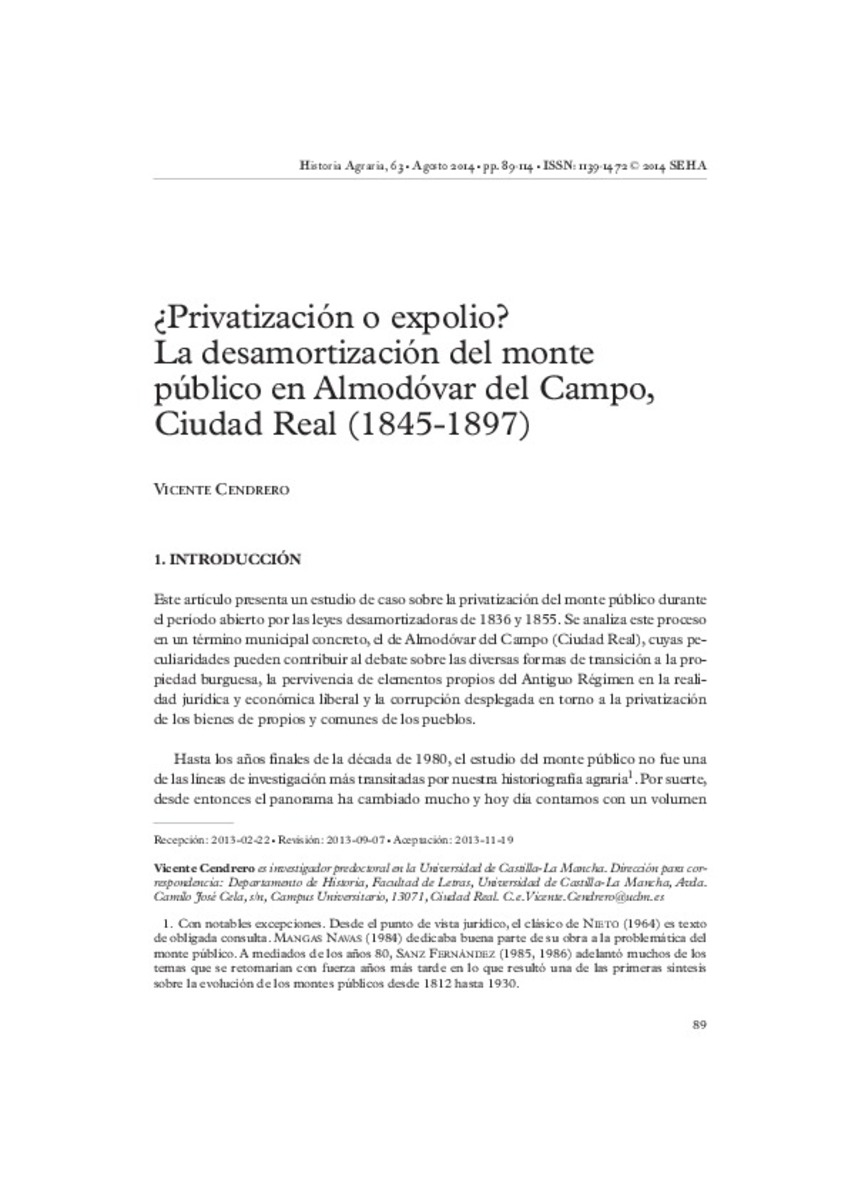Mostrar el registro sencillo del ítem
¿Privatización o expolio? La desamortización del monte público en Almodóvar del Campo, Ciudad Real (1845-1897).
| dc.contributor.author | Cendrero, Vicente | |
| dc.date.accessioned | 2016-02-17T11:24:30Z | |
| dc.date.available | 2016-02-17T11:24:30Z | |
| dc.date.issued | 2014-08 | |
| dc.identifier.issn | 1139-1472 | |
| dc.identifier.uri | http://hdl.handle.net/10234/150325 | |
| dc.description.abstract | El pueblo de Almodóvar del Campo (Ciudad Real) llegó al año 1895 con 63.269 hectáreas de montes públicos sin desamortizar. Dos años después, tan enorme territorio quedó privatizado, incluyendo también los terrenos exceptuados de la desamortización por motivos forestales. La presente investigación pivota sobre dos cuestiones: ¿por qué estos montes no se vendieron hasta fecha tan tardía, casi medio siglo después de la Ley Madoz? y ¿por qué se privatizaron también los exceptuados? La respuesta se encuentra en la pervivencia del «derecho maestral», una antigua renta señorial que complicó la delimitación de la nueva propiedad establecida por las desamortizaciones liberales en pueblos de antiguas órdenes militares, como fueron los del Campo de Calatrava. Con una metodología microanalítica se profundiza en los fraudes sistemáticos en las subastas y tasaciones de los terrenos, en los afanes especulativos de la oligarquía local y en la peculiaridad de un nuevo sujeto creado ad hoc y titulado «Sociedad Compradora» que, controlada por dicha oligarquía, revendió de inmediato tan enorme cifra de hectáreas a un mayor precio. Las fuentes municipales corroboran los entresijos de este proceso de acumulación de capital que conllevó el empobrecimiento del campesinado en esta comarca. | ca_CA |
| dc.description.abstract | As late as 1895, the town of Almodóvar del Campo (Ciudad Real province) still controlled 63,269 hectares of public forest. Yet, just two years later, that huge area of land had been privatized, including land supposedly excluded from disentailment for environmental reasons. This paper focuses on two main issues: why were these forests not sold until 1895 almost half a century after the Madoz disentailment law‐ and why were exempted lands privatized as well? The answer lies in the survival of the derecho maestral, an ancient feudal rent that complicated the definition of new property established by the liberal disentailment laws in towns that belonged to former military orders. We use a microanalytical methodology to examine systematic, fraudulent practices in the context of public auctions and land valuations. In addition, we explore the speculative behaviour of local oligarchies and focus on the use of a peculiar society, the Sociedad Compradora (Purchasing Company), which was created ad hoc and controlled by the local oligarchy to immediately resell privatized lands at a profit. Municipal sources confirm the intricacies of this capital accumulation process and how it resulted in the impoverishment of the peasantry in this region. | ca_CA |
| dc.format.extent | 26 p. | ca_CA |
| dc.format.mimetype | application/pdf | ca_CA |
| dc.language.iso | spa | ca_CA |
| dc.publisher | Sociedad Española de Historia Agraria (SEHA) | ca_CA |
| dc.relation.isPartOf | Historia agraria: Revista de agricultura e historia rural, nº 63, pp. 89-114 | ca_CA |
| dc.rights | © 2014 SEHA | ca_CA |
| dc.rights.uri | http://rightsstatements.org/vocab/InC/1.0/ | * |
| dc.subject | desamortización | ca_CA |
| dc.subject | bienes comunales | ca_CA |
| dc.subject | monte público | ca_CA |
| dc.subject | derecho maestral | ca_CA |
| dc.subject | especulación | ca_CA |
| dc.subject | disentailment | ca_CA |
| dc.subject | commons | ca_CA |
| dc.subject | public forest | ca_CA |
| dc.subject | speculation | ca_CA |
| dc.title | ¿Privatización o expolio? La desamortización del monte público en Almodóvar del Campo, Ciudad Real (1845-1897). | ca_CA |
| dc.type | info:eu-repo/semantics/article | ca_CA |
| dc.subject.jel | H41 | ca_CA |
| dc.subject.jel | N53 | ca_CA |
| dc.subject.jel | O13 | ca_CA |
| dc.subject.jel | P14 | ca_CA |
| dc.rights.accessRights | info:eu-repo/semantics/openAccess | ca_CA |
| dc.relation.publisherVersion | http://historiaagraria.com/info_articulo.php?id=663 | ca_CA |







